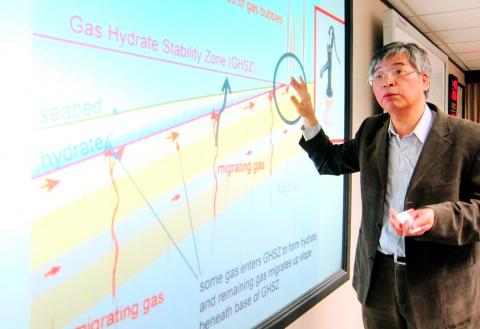Researchers claim to have unlocked the interaction patterns between the seabed fluctuations in the southwestern oceanic area of Taiwan, which is home to many underwater mud volcanoes, and the ebb and flow of tides.
A team from National Central University also discovered that during seabed fluctuations caused by changes in tides, methane gas is released into the water and atmosphere, which may be collected for energy resources or become greenhouse gas.
At a press conference at the National Science Council yesterday, Hsu Shu-kun (許樹坤), a professor of earth sciences at the university, said there are many mud volcanoes about 100m tall located 500m or more below the surface of the sea in that area.

Photo: Chen Yi-ching, Taipei Times
His council-funded team found that as the tide changes, the depth of the water also changes, leading to changing water pressure on the seabed.
When the tide is low, Hsu said, the water becomes shallower, reducing the water pressure on the seabed, whereupon methane clathrate (methane trapped within a crystal structure of water, in the form of a solid) under the seabed releases the methane component and is released from the more shallow parts of the seabed.
Hsu said the release of methane from the seabed about 500m underwater and the fluctuations of the seabed in connection with the changing tide work like a “water pump.” He said such a process has not been found in other parts of the world.
Based on the data gathered so far, the concentration of methane and carbon dioxide released as a result of seabed fluctuations is very high, Hsu said.
If ways were found to collect the methane, Hsu said, it could be turned into a valuable energy source.

Taiwan is stepping up plans to create self-sufficient supply chains for combat drones and increase foreign orders from the US to counter China’s numerical superiority, a defense official said on Saturday. Commenting on condition of anonymity, the official said the nation’s armed forces are in agreement with US Admiral Samuel Paparo’s assessment that Taiwan’s military must be prepared to turn the nation’s waters into a “hellscape” for the Chinese People’s Liberation Army (PLA). Paparo, the commander of the US Indo-Pacific Command, reiterated the concept during a Congressional hearing in Washington on Wednesday. He first coined the term in a security conference last

Prosecutors today declined to say who was questioned regarding alleged forgery on petitions to recall Democratic Progressive Party (DPP) legislators, after Chinese-language media earlier reported that members of the Chinese Nationalist Party (KMT) Youth League were brought in for questioning. The Ministry of Justice Investigation Bureau confirmed that two people had been questioned, but did not disclose any further information about the ongoing investigation. KMT Youth League members Lee Hsiao-liang (李孝亮) and Liu Szu-yin (劉思吟) — who are leading the effort to recall DPP caucus chief executive Rosalia Wu (吳思瑤) and Legislator Wu Pei-yi (吳沛憶) — both posted on Facebook saying: “I

The Ministry of Economic Affairs has fined Taobao NT$1.2 million (US$36,912) for advertisements that exceed its approved business scope, requiring the Chinese e-commerce platform to make corrections in the first half of this year or its license may be revoked. Lawmakers have called for stricter enforcement of Chinese e-commerce platforms and measures to prevent China from laundering its goods through Taiwan in response to US President Donald Trump’s heavy tariffs on China. The Legislative Yuan’s Finance Committee met today to discuss policies to prevent China from dumping goods in Taiwan, inviting government agencies to report. Democratic Progressive Party Legislator Kuo Kuo-wen (郭國文) said

The Ministry of Economic Affairs has fined Taobao NT$1.2 million (US$36,900) for advertisements that exceeded its approved business scope and ordered the Chinese e-commerce platform to make corrections in the first half of this year or its license would be revoked. Lawmakers have called for stricter supervision of Chinese e-commerce platforms and more stringent measures to prevent China from laundering its goods through Taiwan as US President Donald Trump’s administration cracks down on origin laundering. The legislature’s Finance Committee yesterday met to discuss policies to prevent China from dumping goods in Taiwan, inviting government agencies to report on the matter. Democratic Progressive Party